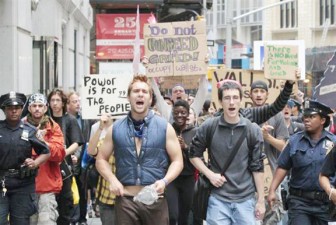MOSCOW (Reuters) – Vladimir Putin has risked harming Russia’s economy by firing his finance minister, a prominent economist and business leader said yesterday, adding to scattered warnings of crisis since Putin confirmed he would reclaim the presidency.
Anatoly Chubais, the architect of liberal economic reforms in the 1990s and Kremlin chief of staff under Boris Yeltsin, said the prime minister no longer had top-notch professionals running the economy at a time of dangerous global turmoil.
Other economists and business people have also voiced worry about the economic and political uncertainty caused by Alexei Kudrin’s departure as finance minister on Monday and the high-level disagreements it has exposed over Putin’s plan to swap roles with President Dmitry Medvedev in forthcoming elections.
Though public dissent is patchy, some have gone so far as to say the return of Putin, who succeeded Yeltsin as president in 2000, risks a stagnation that could create deeper conflicts.

Chubais, who now heads state high-technology group Rusnano, wrote in a blog that Kudrin’s departure could have dramatic consequences: “This event, whatever the reasons for it, creates serious risks for the country.
“There are no longer any professionals at such a high level who can work in the current political configuration.
“This is especially dangerous against the background of a looming second wave of the global economic crisis. In such unfavourable circumstances, the consequences of his resignation could be dramatic.”
Putin’s announcement on Saturday that he will reclaim the presidency in an election in March, while Medvedev replaces him as prime minister, was meant to end uncertainty over who will be ruling the world’s biggest country for the next six years.
Polls show Putin, 58, is all but sure to return to the post he held for eight years until 2008. But he unwittingly caused new uncertainty by triggering a revolt by Kudrin, long regarded by investors as the anchor of financial stability.
Kudrin said he would not serve in a Medvedev government and was forced to resign after attacking the president’s economic policies in an unusually bitter and public dispute.
His interim replacement, Anton Siluanov, said on Tuesday he would implement spending increases that Kudrin had criticised, but he added that further expenditure would threaten economic stability: “Additional spending may create risks,” he said.
“We should not raise spending without finding corresponding sources of revenue.”
Chubais is despised by many Russians for allowing Russia’s most valuable assets to fall into the hands of a small circle of businessmen who became super-rich after the collapse of the Soviet Union but his views are still respected at high levels.
His remarks followed a warning on Tuesday by Mikhail Prokhorov, one of Russia’s wealthiest tycoons, that signalled Putin will have to work hard to repair the cracks in unity.
“I think we are on the verge of very important, perhaps tectonic, shifts in the consciousness of the elites, including the power elites,” Prokhorov, recently ousted as leader of a Kremlin-backed liberal party, wrote in a blog.
.
Just how far the divisions go is hard to assess. No other leaders have joined Kudrin in openly dissenting against Putin’s plan — doing so would be political suicide — and the ruling United Russia party rallied behind him at a weekend congress.
But although opinion polls show Putin and Medvedev are still more popular than any other politicians, their ratings have slipped and the Internet has been full of criticism of how they have carved up power between them.
A portrait has been circulating on the Internet showing Putin’s face superimposed on a portrait of Leonid Brezhnev, whose rule of the Soviet Union from 1974 to 1982 is widely seen as one of economic and political stagnation.
Russia also faces a backlog of problems which economists say should have been tackled long ago and must be dealt with by the next government to avert crisis.
These include reducing Russia’s dependence on gas and oil revenues, which make up half of the budget in the world’s biggest energy producer, tackling corruption, reforming the creaking pension system and halting capital flight.
Investment is badly needed in infrastructure projects such as building roads, the gap is growing between the rich and poor in the vast country, poverty is on the rise and the population — now about 142 million — is declining.
“I think Kudrin personifies fiscal stability in Russia,” Roland Nash of investment firm Verno Capital told Reuters Insider television.
Predicting more changes in the government, he said: “I think everything is up for grabs now.” Putin sought to restore unity on Tuesday by handing control of all the economic ministries to Igor Shuvalov, 44, an ally who has been a first deputy prime minister since 2008. He named Siluanov, a former Kudrin deputy, his acting finance minister. Kudrin released remarks on Tuesday saying he had quit because of the fiscal risks the government was taking, and made clear there had been disagreements with Putin as well as Medvedev for months.
He said he had also tendered his resignation in February, when he called for fair elections to help avert economic and political stagnation, but Putin had rejected it.
Some political analysts say the power-sharing “tandem” set up by Putin and Medvedev in 2008, when the former yielded the presidency to his protege because of a constitutional two-term limit, has become less effective.
“The tandem has lost its tempo,” said Gleb Pavlovsky, president of the Foundation for Effective Politics.
Medvedev himself has hinted that changes are needed in the political system that has been established under Putin. In veiled criticism of the system, he said in a speech in June that Russia must avoid one-man rule to avert stagnation.








